37 Joint research teams from TMDU and Tokyo Tech announce innovative findings
On April 10, Tokyo Medical and Dental University (TMDU) and Tokyo Institute of Technology (Tokyo Tech), which plan to merge in October 2024, hosted the "TMDU and Tokyo Tech Matching Fund Research Results Presentation and Research Exchange Meeting" at TMDU. The event drew 314 participants, including researchers from inside and outside of the universities, corporate representatives, media, and local government officials.
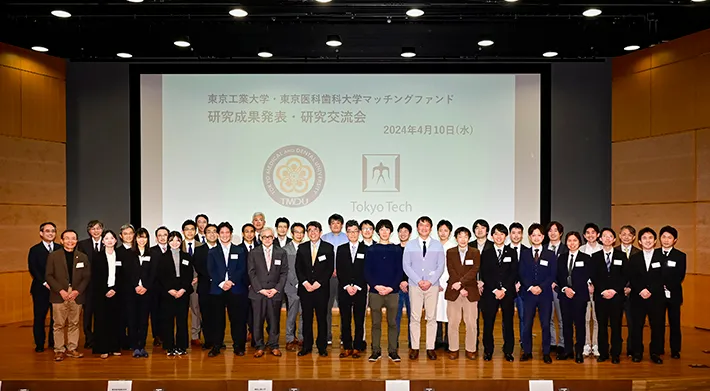
Promoting collaboration for Science Tokyo
TMDU and Tokyo Tech are working towards establishing Science Tokyo, focusing on the "close integration of medical and dental sciences with engineering to better serve society." To promote bottom-up collaborative research, the universities have established the "TMDU-Tokyo Tech Matching Fund" to support interdisciplinary research funding. At the event, 37 research teams funded from 2022 to 2023 presented their innovative results and engaged with attendees.
TMDU President Yujiro Tanaka said in his opening remarks, "Tokyo Tech President Kazuya Masu and I often discuss that one of the key points of our university integration is convergence science and interdisciplinary fusion. Today, we hope to share concrete examples of this with everyone and make this an opportunity to connect with our future activities."
Oral presentations on diverse medical-engineering research
During the first half of the event, 23 research teams selected in the first call for applications for the 2023 Matching Fund gave oral presentations. Researchers from the joint teams of both universities took turns presenting, explaining their collaborative research that crosses the boundaries between engineering and healthcare.
"During the COVID-19 pandemic, TMDU faced problems with thrombi in ECMO (extracorporeal membrane oxygenation) machines. This led to a collaboration with Associate Professor Wataru Hijikata (Tokyo Tech‘s Department of Mechanical Engineering, School of Engineering) to study thrombus prevention using pulsatile flow from a centrifugal pump. With the support of the fund, we verified the effectiveness of thrombus suppression in membrane oxygenators through four animal experiments" (Junior Associate Professor Tatsuki Fujiwara, Department of Cardiovascular Surgery, Graduate School of Medical and Dental Sciences, TMDU).
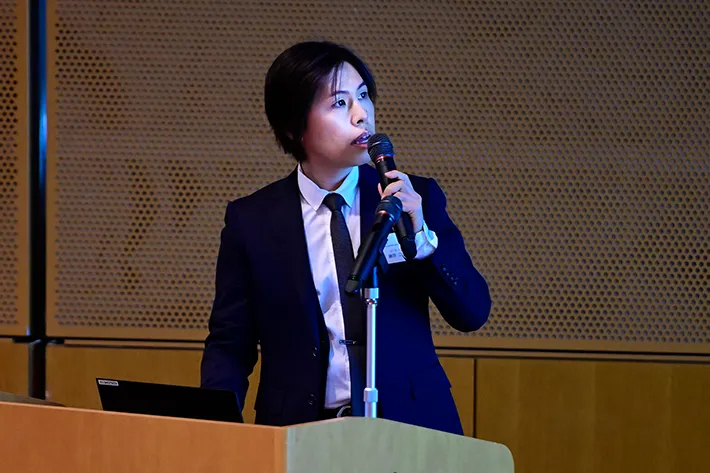
This session highlighted various research approaches, such as "using engineering solutions to address healthcare challenges" (medical treatment), as well as innovative projects that combine the latest in engineering and medicine to create new value, such as "using nanomachines to safely and efficiently deliver mRNA, a blueprint for proteins, to the brain for potential applications in the treatment of various diseases" (drug delivery).
The potential applications of the research extended beyond "medical treatment" and "drug delivery." Researchers also discussed "assessment" research monitoring eye movement to objectively evaluate mental health, "dentistry" research on the mechanisms of tumor fibrosis in oral cancer, "fundamental technologies" research like virus detection and cell death with broad applications, and studies using eye tracking to clarify critical points in risk prediction in medical settings, contributing to "hazard prediction" and "education."
Osamu Watanabe, Tokyo Tech's Executive Vice President for Research Initiatives, gave a speech to close the session. He said, "The Matching Fund was created in response to strong demand from young researchers at both universities. Today's presentations included many vivid examples of collaboration between medical and engineering fields, showing research driven by both medical needs and engineering innovation. I felt the passionate spirit of integration and interdisciplinary fusion. We will continue these activities and appreciate your support and cooperation, including the exploration of academic-industrial partnerships."
Poster presentations and networking
A poster session and networking reception followed the oral presentations. In addition to the 23 groups that gave oral presentations, posters summarizing the key points of 37 research teams were displayed. These included 6 teams selected in the second call of the 2023 Matching Fund and 8 teams from the 2022 Interdisciplinary Research Grants. Representatives from each research team explained their work to the attendees.
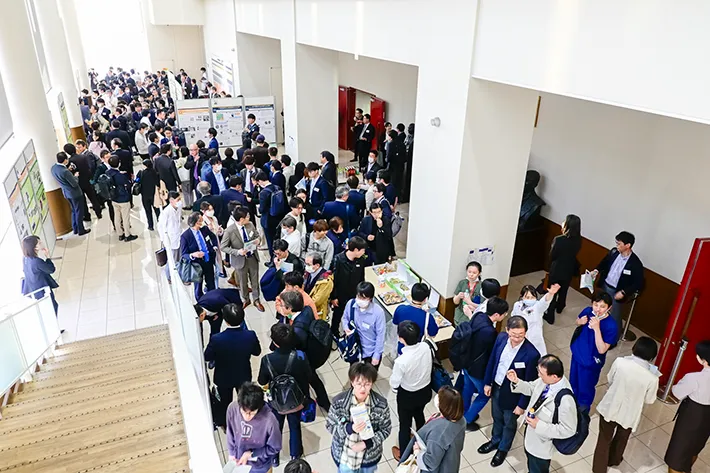
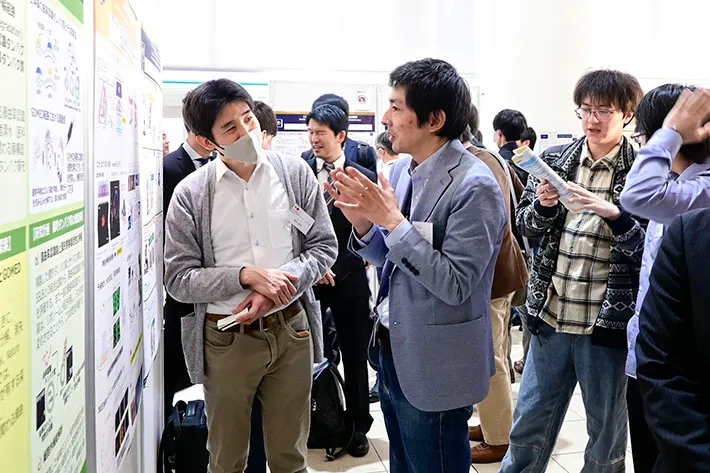
In a relaxed atmosphere, researchers interested in interdisciplinary research from within and outside the universities, along with representatives from about 40 companies in industries such as healthcare, electronics, chemistry, food, and information and communication, engaged in enthusiastic discussions with the research representatives. Officials from academic promotion agencies, government institutions, and media also attended to explore potential research support opportunities.
Associate Professor Takuya Oki from Tokyo Tech's Department of Architecture and Building Engineering, School of Environment and Society, presented on three topics: "Developing new 'quality of care indicators' for intensive care units based on spatiotemporal analysis of movement, environment, and biometric data," "Identifying causes of surgical level misrecognition in spinal cord surgery using eye-tracking technology," and "Visualizing and quantifying the working styles of healthcare workers to achieve effective work style reform." He stated, "I established connections with TMDU researchers at the 2023 Matching Event, which led to our joint research. At today's event, I was able to deepen discussions with many new people. In the future, I plan to explore ways to improve medical practice based on our research results."
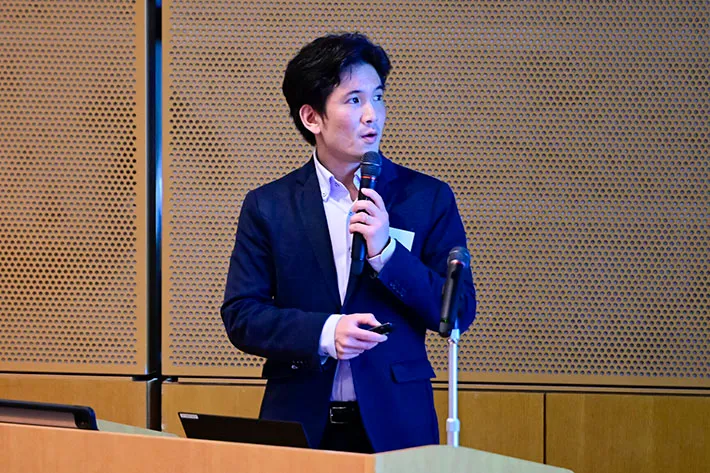
The event, which widely shared the results of diverse interdisciplinary research with both internal and external audiences, concluded with remarks from TMDU's Executive Director and Executive Vice President of Research and University Innovation, Tetsushi Furukawa. He stated, "Deepening exchanges between our universities in the medical field will greatly benefit both the resolution of medical challenges and the generation of new ideas in engineering research. We plan to create more opportunities for such interactions, so please look forward to them."
A subsequent survey gathered numerous comments from participants, such as, "I was able to learn about the future prospects of current research from various perspectives," and "I have high expectations that becoming a single university will further accelerate medical-engineering collaboration, leading to more advanced research."
Tokyo Medical and Dental University and Tokyo Institute of Technology will continue to strengthen their cooperation as the establishment of Science Tokyo approaches.